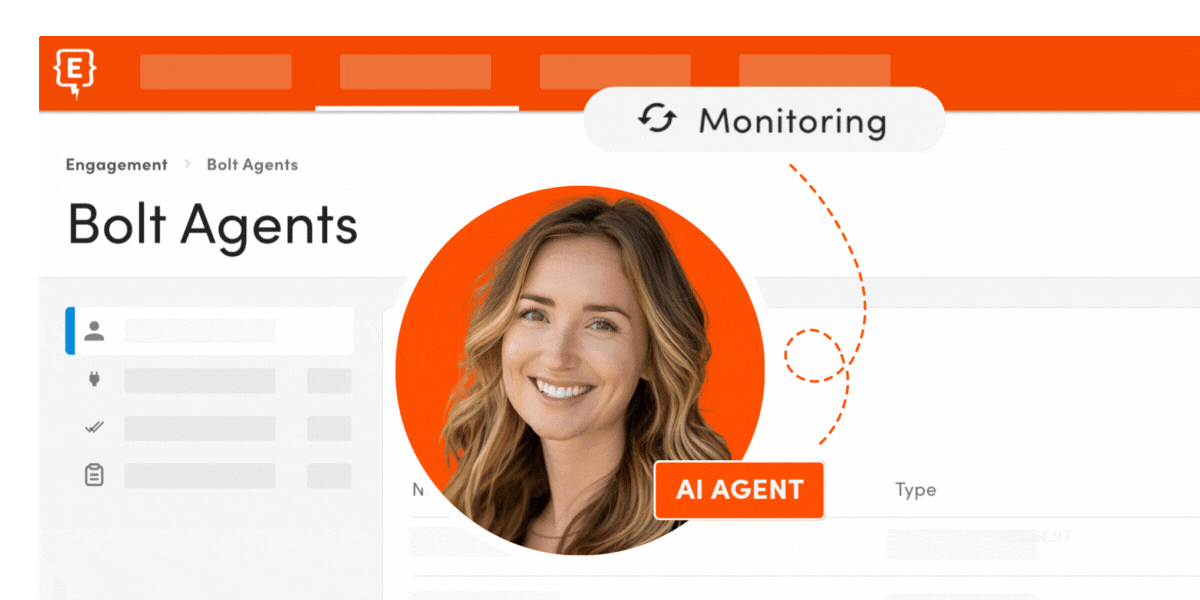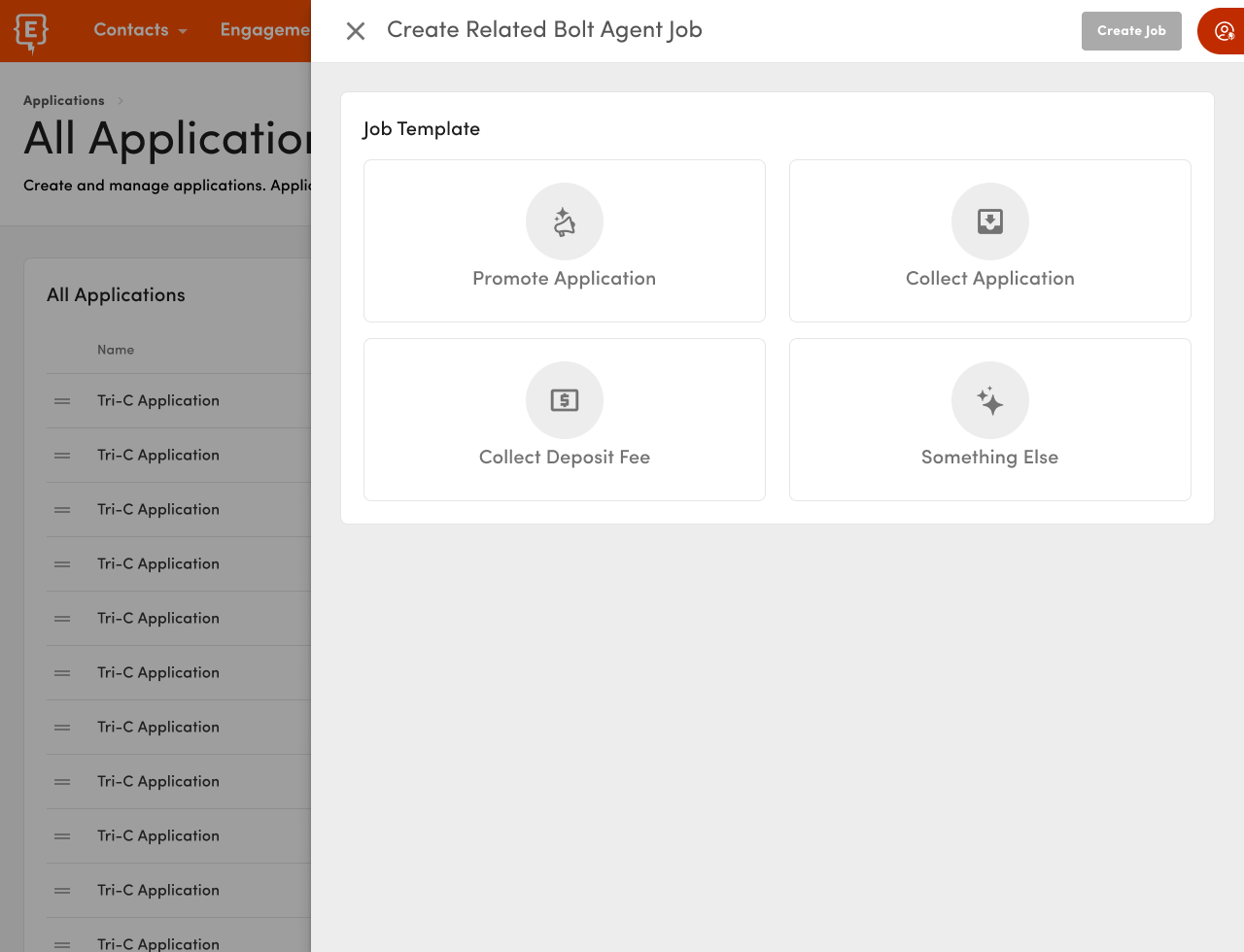The Future of AI Search: A Game Changer for SEO and Higher Ed Websites
by Brandon Hurter · Updated Nov 05, 2024

The rise of generative AI, particularly in search technology, is reshaping the digital landscape. Major tech players like OpenAI, Google, Meta, and others have introduced AI-powered search capabilities that revolutionize how users find information. For higher education marketers understanding this shift is critical. The search experience as we know it is evolving from traditional keyword-driven queries to contextual, conversation-based interactions, fundamentally altering how people interact with the web and discover content.
In this blog post, we’ll explore what generative AI search means for SEO, the implications for websites—particularly those in higher education—and how to prepare for a future where traditional digital marketing practices may need to adapt.
The Evolution of Search: From Keywords to Conversations
Historically, SEO has been grounded in keywords and optimized navigation. Higher education institutions, like universities, have invested heavily in websites, ensuring that prospective students could navigate content and discover program offerings via search engines. In this model, Google acted as the gatekeeper, linking users to specific content on websites.
With generative AI search, this model is shifting. AI-powered search engines now prioritize conversation-like interactions over keyword-based queries, understanding the user’s intent on a deeper level. Users can now ask more complex, conversational questions and receive summarized answers without needing to navigate through multiple links. For example, instead of typing “best data science master’s programs,” users might ask, “What is the best program for data science in the U.S. for someone interested in research?” This flexibility is particularly relevant to higher education, where prospective students often have specific and nuanced questions.
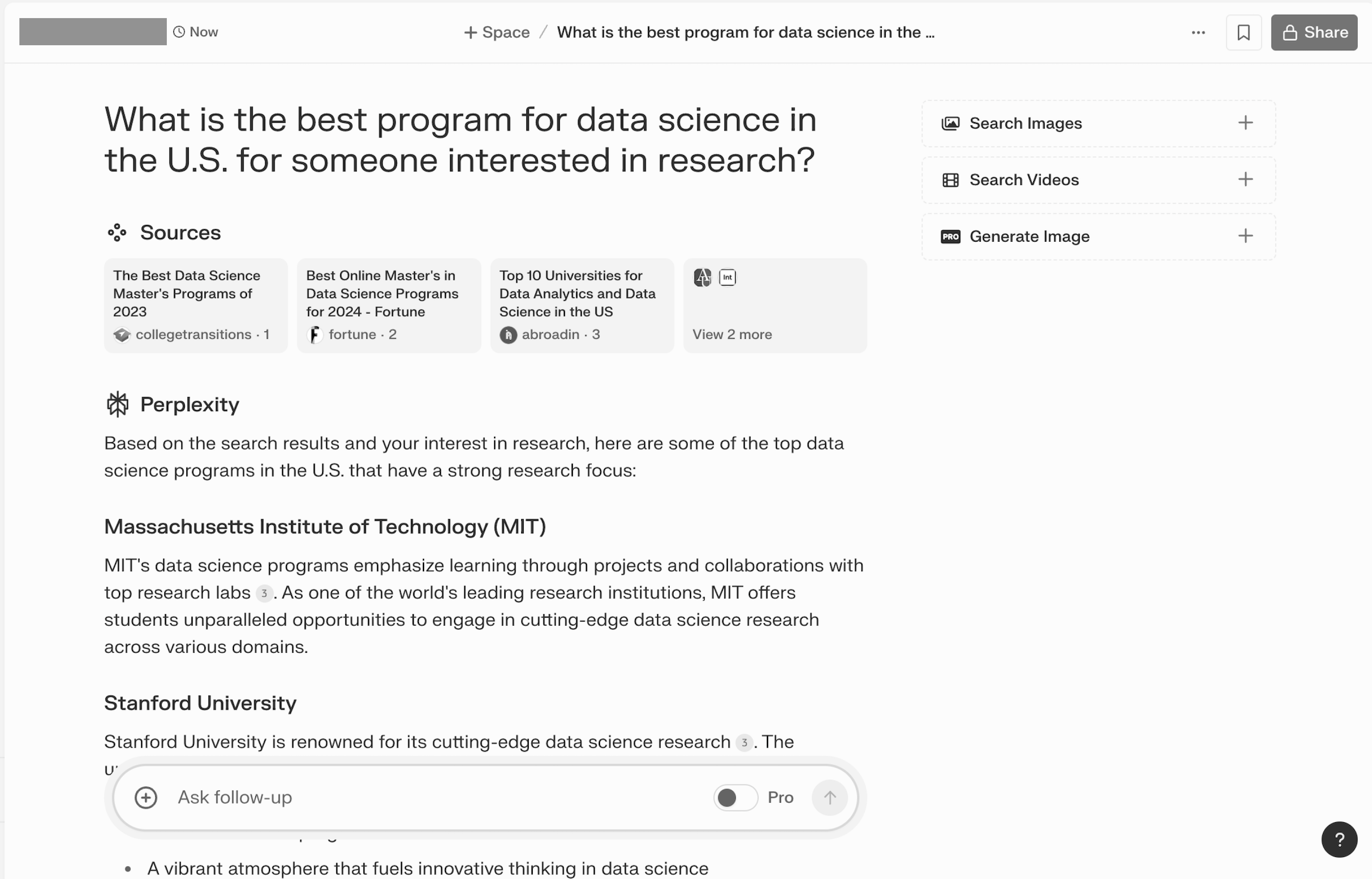
perplexity.ai/search
Key Components of Generative AI Search and Their Impact
Generative AI search technologies bring several advancements that reshape how content is discovered online. Here’s how these new elements play out in search and SEO:
- Natural Language Processing (NLP): Generative AI search uses NLP to understand the complexities of human language. This enables users to ask questions conversationally, which the AI interprets for meaning, context, and relevance. In higher ed, this might mean that a prospective student could ask questions in everyday language rather than using precise keywords like “university admissions requirements.”
- Personalization: Generative AI search can tailor results based on the user’s context, location, and previous interactions. This capability allows for a personalized experience that reflects individual needs and preferences. For higher education institutions, this could mean search engines presenting content tailored to the student’s location, academic interests, or preferred learning format.
- Contextual Memory: Conversational AI search engines, like OpenAI’s ChatGPT and Google’s Gemini, retain context from previous interactions, allowing users to dive deeper without starting over. This contextual memory helps provide a cohesive, dialogue-based experience. For instance, after an initial question about undergraduate programs, a user could come back three days later and ask a follow-up, “What about graduate opportunities in the same field?”
- Rich, Summarized Results: Traditional search results pages with blue links are replaced with rich, summarized answers drawn from multiple sources. This shift will likely affect website traffic, as users might no longer need to click through to individual sites if they can get their answer directly in the search results. Higher ed websites will likely see fewer visits as a result, though the users who do visit will come with more specific intentions.
Implications for SEO and Higher Education Websites
As search behavior shifts, so too must SEO strategies. Here’s what generative AI search means for websites, especially in higher education:
- Traffic Shifts and Website Roles Will Evolve: As generative AI answers more user questions directly, traffic to websites is expected to decrease. Higher education websites, in particular, will serve less as entry points for general information and more as destinations for users seeking specific, authentic experiences. For example, users may rely on generative search for basic program overviews and only visit a university’s website for detailed information about campus culture, student experiences, or faculty.
- The Need for Unique and Authentic Content: With AI algorithms pulling content from diverse sources to answer queries, it’s more important than ever for institutions to ensure their websites offer unique, authentic perspectives. AI may even quote phrases from your site verbatim if it deems them authoritative. Higher education sites should emphasize original content that reflects the institution’s character, unique offerings, and student success stories. This approach not only differentiates them but also serves as a valuable source for AI to draw upon.
- Focus on User Experience and Emotional Connection: With fewer general users visiting, the importance of a high-quality, engaging user experience (UX) increases. Higher education websites must focus on creating an immersive experience that conveys campus culture and student life, elements that AI can’t replicate. By showcasing campus imagery, testimonials, and interactive content, institutions can offer prospective students an experience that feels personal and real—one that AI-generated summaries can’t provide.
- Social Media and Aggregator Sites as New Hubs for Brand Visibility: Generative AI search relies heavily on aggregating data from multiple sources. To maintain visibility, higher education institutions should distribute content on platforms like LinkedIn, Substack, Wikipedia, and Reddit. By building a presence on these sites, institutions increase the likelihood that generative AI will source their content in its summaries. Social media also becomes a critical avenue for showcasing the institution’s personality and authenticity, potentially driving users to the website for further exploration.
How to Prepare: Next Steps for Higher Ed Marketers
To adapt to this changing landscape, higher ed marketers should consider the following steps:
- Enhance Content Quality: Focus on producing unique, high-quality content that reflects the institution’s values and personality. This content will be essential for AI to pull from and for building an authentic online presence.
- Optimize for Conversational Search: Update website copy to align with conversational search queries rather than traditional SEO keywords. Think about the types of questions prospective students or their families might ask and address them directly on your site.
- Leverage Social and Aggregator Platforms: Ensure your institution’s content is present on high-traffic platforms like LinkedIn, Substack, and Wikipedia, which AI search engines often reference. This increases the institution’s visibility and reinforces its expertise.
- Personalize User Experience on Your Website: Implement dynamic elements on your website that can adjust based on visitor demographics or preferences. This personalization will enhance the visitor experience, making it memorable and relevant.
- Invest in Paid Search and Social Advertising: As organic search traffic declines, it’s critical to bolster paid search and social media strategies. This shift ensures continued visibility and engagement with your target audience despite changes in organic search behavior.
- Continue Monitoring AI Search Developments: Generative AI is rapidly evolving, so staying informed on the latest advancements is essential. Understanding how changes in search affect SEO will help you stay ahead of the curve and make necessary adjustments to your strategy.
Conclusion
Generative AI search is redefining how users interact with information online, impacting SEO and shifting the role of websites, especially in higher education. While this change presents challenges, it also offers an opportunity to create deeper, more meaningful connections with users who do visit the site. For higher ed marketers, embracing these changes, emphasizing authenticity, and adopting a dynamic content strategy will be essential to thrive in the new era of search.
As AI-powered search continues to evolve, so must our strategies. By focusing on quality content, personalization, and leveraging new platforms, higher education institutions can ensure they remain a trusted source of information in this AI-powered world.
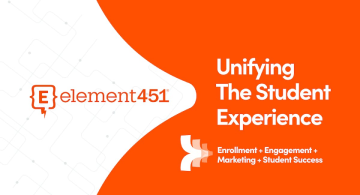
About Element451
Boost enrollment, improve engagement, and support students with an AI-driven CRM and agent platform built for higher ed. Element451 makes personalization scalable and success repeatable.
Categories
New Blog Posts
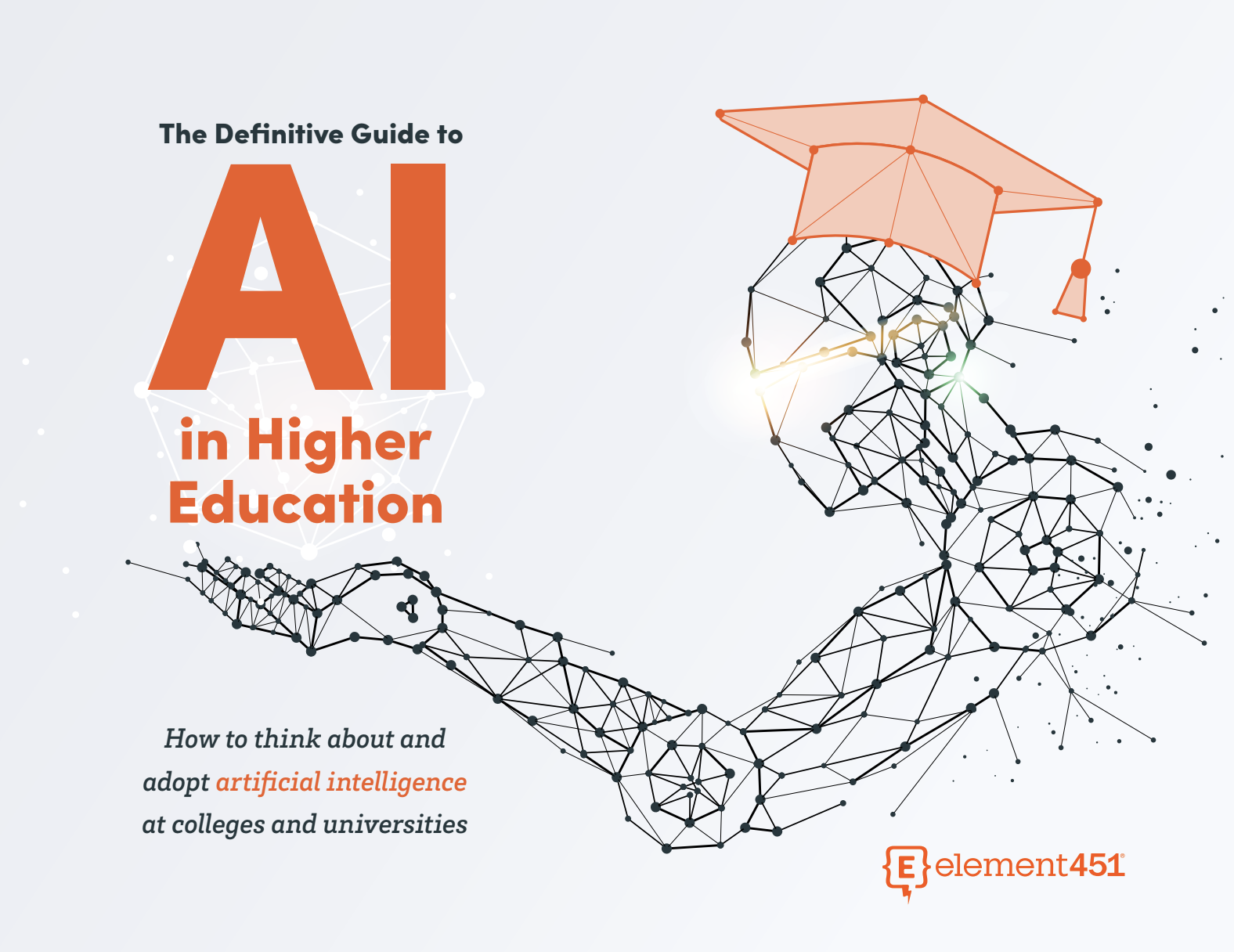
The Definitive Guide
AI in Higher Education
Bridge the gap between the latest tech advancements and your institution's success.
Useful Links

Talk With Us
Element451 is an AI-driven CRM and AI agent platform for higher education. Our friendly experts are here to help you explore how Element451 can improve outcomes for your school and students.
Get a Demo


